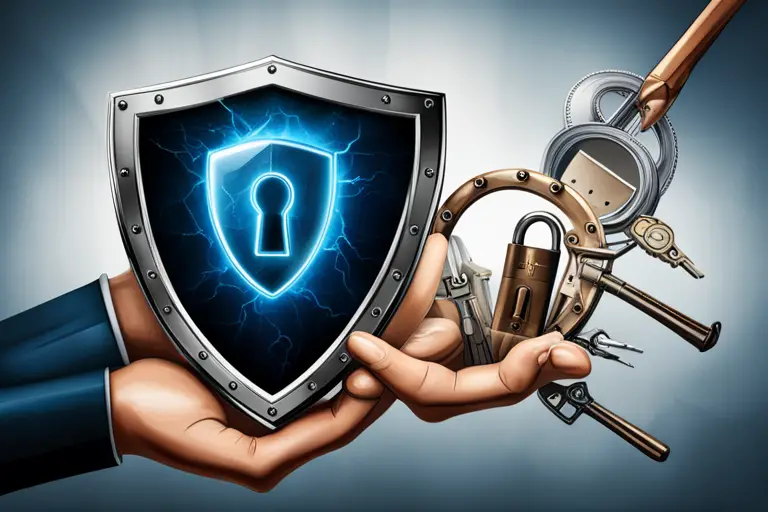Are you tired of constantly worrying about the security of your online accounts? Do you want to ensure that your personal information and data are protected from hackers? The first step towards achieving this goal is to master the art of password protection.
In today’s digital age, passwords are the first line of defense against cyber attacks. Unfortunately, many people make the mistake of using weak and easily guessable passwords, putting their accounts at risk.
In this article, you will learn the importance of strong passwords, how to create them, and the common mistakes to avoid. By the end of this article, you will have the tools and knowledge necessary to protect your online accounts and keep hackers at bay.
Understanding the Importance of Strong Passwords
Don’t underestimate the power of a strong password – it can be the difference between keeping your sensitive information secure or falling victim to a cyberattack.
A strong password is a combination of letters, numbers, and symbols that make it difficult for hackers to guess or crack. It’s crucial to use different passwords for each account and avoid using easily guessable information like your name, birthdate, or pet’s name.
Hackers use sophisticated tools to crack passwords, and weak passwords make it easier for them to gain access to your accounts. They can steal your personal information, use it for identity theft, or even access your financial accounts.
A strong password helps to protect your online identity and prevent unauthorized access to your accounts. So, take the time to create a strong password and keep your information safe.
Creating Strong Passwords
You can easily strengthen your online security by crafting passwords that are unique and complex. There are several ways to create strong passwords, such as using a combination of upper and lower case letters, numbers, and special characters.
Avoid using obvious phrases or personal information, as these can be easily guessed by hackers. Another tip is to make your passwords longer than the minimum required length. The longer the password, the harder it is for hackers to crack.
It’s also important to use different passwords for each of your accounts. This way, if one password is compromised, your other accounts will still be secure. By taking the time to create strong passwords, you can greatly reduce the risk of your accounts being hacked.
Avoiding Common Password Mistakes
To ensure your online security, it’s important to be aware of common mistakes people make when creating passwords. One of the most common mistakes is using easily guessable information, such as your name, birthdate, or even the word ‘password’.
Hackers can easily find this information through social media or other online sources. It’s important to use unique and random combinations of letters, numbers, and symbols that aren’t related to your personal information.
Another mistake to avoid is using the same password for multiple accounts. If a hacker were to gain access to one of your accounts, they would have access to all of your accounts with the same password. Instead, use a different password for each account and consider using a password manager to keep track of all your passwords.
By avoiding these common password mistakes, you’ll be taking an important step towards protecting your online security.
Remembering Your Passwords
Remembering all the different combinations of letters, numbers, and symbols for each of your online accounts can be challenging and overwhelming. However, there are some tips and tricks that can help you remember your passwords without compromising your security.
One way to remember your passwords is to create a phrase or sentence that’s easy for you to remember but difficult for others to guess. For example, you can take the first letter of each word in a sentence and use them to create a password.
Another tip is to use a password manager, which is software that securely stores all your passwords in one place. This way, you only need to remember one master password to access all your accounts.
Remembering your passwords may seem daunting, but with these tips, you can keep your accounts secure without sacrificing convenience.
Using Password Managers
Using a password manager can simplify and secure your online login process. These tools are designed to generate strong passwords and store them securely. This means you don’t have to remember all your passwords, and you can use a different, complex password for each account without worrying about forgetting them.
Password managers work by encrypting your passwords and storing them in a digital vault. You only need to remember one master password to access this vault, which means you can create unique passwords for each account without having to remember them all.
Some password managers also offer features such as auto-fill, which can save you time when logging in to your accounts. Overall, using a password manager is a smart way to protect your online accounts and make your life easier.
Two-Factor Authentication
Now that you know about using password managers to keep your accounts secure, it’s time to take things to the next level with two-factor authentication.
This extra layer of security can help prevent unauthorized access to your accounts, even if someone manages to steal your password.
Two-factor authentication requires you to provide two types of verification before you can log in to your account. This could include something you know, like a password, and something you have, like a code sent to your phone or a physical security key.
By requiring both types of verification, two-factor authentication makes it much harder for hackers to gain access to your accounts.
So, if you want to take your account security to the next level, consider enabling two-factor authentication wherever possible.
What to Do if Your Account is Hacked
If you ever find yourself in the unfortunate situation of having your account hacked, the first thing you should do is take immediate action to regain control and prevent any further damage. Start by changing your password and enabling two-factor authentication on all your accounts. This ensures that you have an extra layer of protection against unauthorized access.
Next, contact the support team of the service provider and report the incident. They’ll guide you through the process of securing your account and may also provide additional information on how to prevent future attacks.
Remember to keep an eye on your account activity and monitor for any suspicious activity. With quick action and vigilance, you can minimize the damage caused by a hack and prevent it from happening again.
Frequently Asked Questions
How do hackers typically obtain passwords?
Hackers typically obtain passwords through methods such as phishing, social engineering, brute force attacks, and using malware such as keyloggers. They may also try to guess passwords based on personal information they gather about you.
Are there any password protection methods that are guaranteed to be foolproof?
No, there are no foolproof password protection methods. However, you can improve your security by using strong, unique passwords, enabling two-factor authentication, and regularly updating your passwords.
Can using the same password for multiple accounts really pose a significant security risk?
Using the same password for multiple accounts can pose a significant security risk. Hackers can gain access to all your accounts by cracking just one password. It’s important to use unique, strong passwords for each account to increase security.
How often should I change my passwords to maximize security?
To maximize security, change your passwords regularly, at least every three months. Use a mix of upper and lowercase letters, numbers, and symbols. Avoid using personal information or common words.
Is it possible to recover a hacked account and regain access to my data?
Yes, it’s possible to recover a hacked account. Start by resetting your password and enabling two-factor authentication. Contact the service provider and follow their recovery steps to regain access to your data.
Conclusion
So there you have it, now you know how to master the hackers and protect your accounts with strong passwords.
Remember, a strong password is your first line of defense against cyber criminals and identity thieves. Use a combination of letters, numbers, symbols, and uppercase and lowercase characters, and avoid common mistakes like using personal information or using the same password for multiple accounts.
If you have trouble remembering all of your passwords, consider using a password manager to securely store them for you. And for an extra layer of security, enable two-factor authentication whenever possible.
By following these tips, you can ensure that your accounts are well-protected and your personal information stays safe from prying eyes.
So, go ahead and take control of your online security today!

Hey there, tech enthusiasts! I’m your go-to content writer, delving into the fascinating world of technology hacks. Get ready to unlock mind-blowing secrets and discover innovative solutions through my engaging and insightful blogs.

